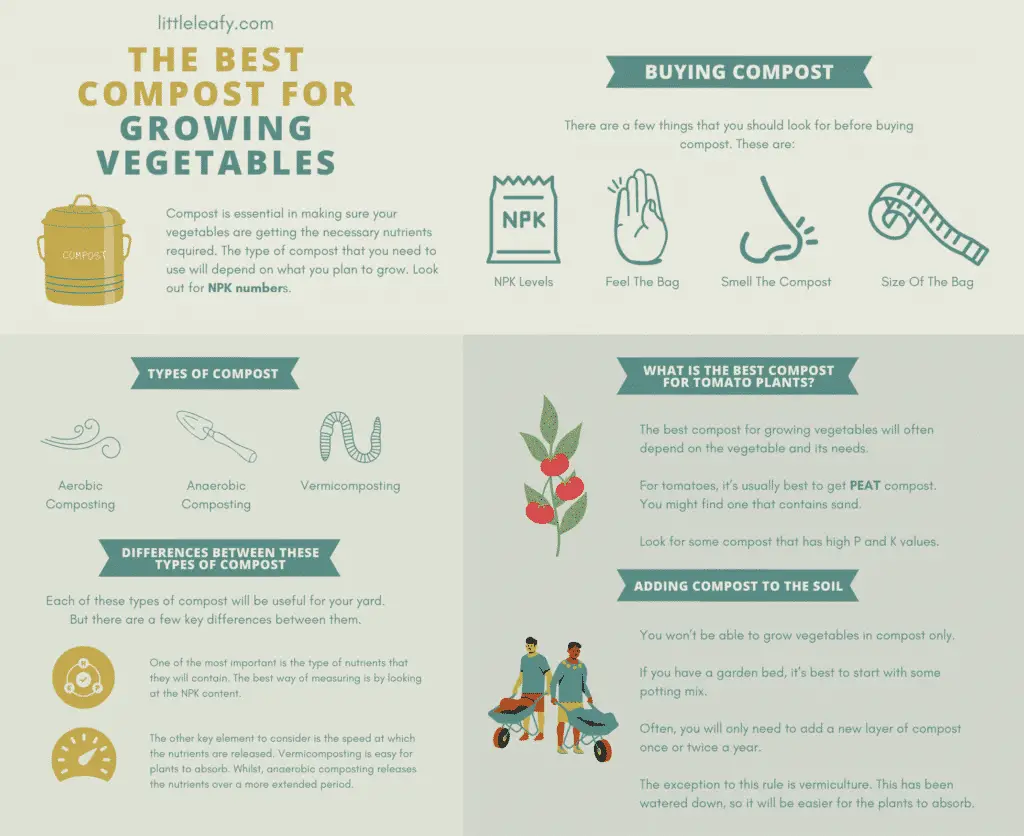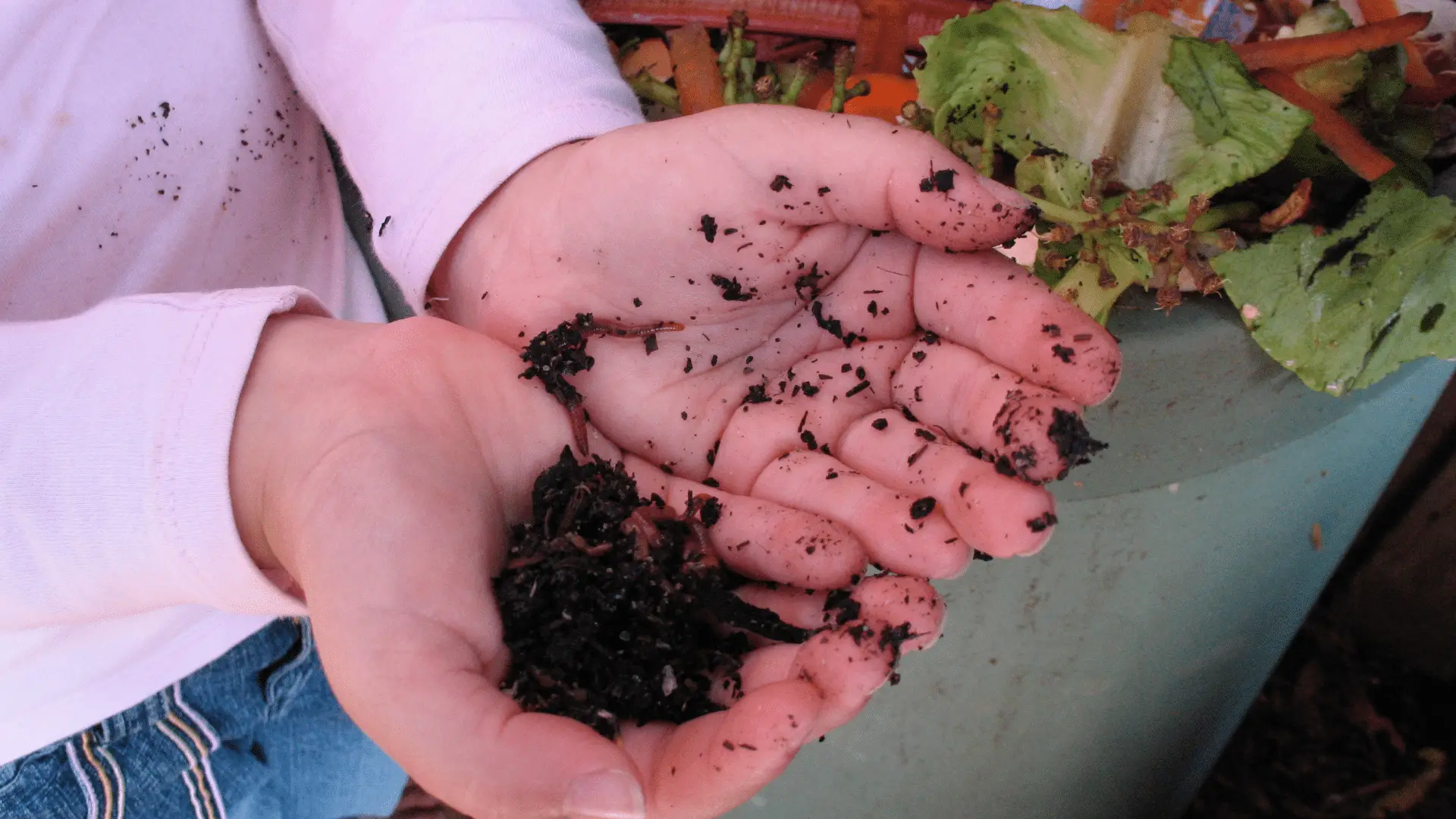Reading Time: 5 minutes 🍃
When you are growing vegetables, you need to make sure that they are getting the necessary nutrients. Often, this will come down to the type of compost you are using. But what is the best kind of compost for growing vegetables?
The type of compost you need to use will depend on the kind of vegetables you plan on growing. It’s best to look at the NPK numbers and compare this with the needs of your vegetables. You’ll also need to think about the type of compost; this will determine how frequently you will need to apply it.
Composting is one of the most important elements to master when you are gardening. Keep reading to learn some simple composting dos and don’ts.
Types of Compost
One of the biggest misconceptions is that there is only one type of compost. There are a few different methods , each with its own set of pros and cons. Here is a brief run-down on each of them:
, each with its own set of pros and cons. Here is a brief run-down on each of them:
- Aerobic composting. This relies on air being added to the compost, helping to break it down. Often, this will involve a tumbler; you’ll need to crank the handle to turn it. This allows more air to be added.
- Anaerobic composting. This is the easiest form of composting. In this case, you will need to dig a large hole and place all your scraps into it. There is one downside, it can often produce an unpleasant smell.
- Vermicomposting. This is another term for a worm farm. This is a good way of breaking things down quickly, without the use of any unpleasant smells.
Differences Between These Types of Compost
Each of these types of compost will be useful for your yard. But there are a few key differences between them. One of the most important is the type of nutrients that they will contain. The best way of measuring is by looking at the NPK content. This stands for nitrogen, phosphorus, and potassium.
Each plant will need a slightly different NPK level to thrive. For example, one carrot and cucumber will thrive in the acidic conditions created by high nitrogen levels. But the nitrogen levels might be too high for something like a tomato.
created by high nitrogen levels. But the nitrogen levels might be too high for something like a tomato.
You might alter the NPK content of your fertilizer through the types of foods you are adding. For example, coffee grounds contain a lot of nitrogen. If you add a lot of them to your mix, you will create more acidic soil.
The other key element to consider is the speed at which the nutrients are released into the soil. For example, vermicomposting uses worm juice. This is a liquid mixture that is easy for the plants to absorb. On the other hand, anaerobic composting creates thicker soil. This will release the nutrients over a more extended period.
If you are planning on growing a wide range of vegetables, it’s best to choose multi-purpose compost. This has been designed to suit the broadest range of vegetables.
Buying Compost
Making compost yourself is an excellent way to reduce the amount of kitchen waste you send to landfills. But it is an intensive process that can take a long time. The good news is that you will be able to buy compost.
You will be able to get it from the local hardware store. This is the most convenient option. Though, the best compost will often come from a garden center. They will use the highest quality ingredients.
When you are buying compost, there are a few things that you should look for . These are:
. These are:
- NPK levels. These will be listed on the bag. It’s a good way of matching the right type of compost with your vegetables, so you will be able to provide the soil conditions they need to thrive.
- Feel the bag. You are looking for compost that looks like dark, fluffy soil. You don’t want to see any wooden pieces in it. You also want to make sure that it is pure compost rather than something that has been mixed with the soil.
- Smell the compost. It should have a healthy, earthy smell. You don’t want to get something that smells of chemicals like ammonia. This is a sign that the compost has gone bad.
- Size of the bag. Compost takes a long time to go off. But that doesn’t mean that you want to store a large bag of compost in the shed for months on end. Plus, it will harden over time, making it more difficult to use.
What is the Best Compost for Tomato Plants?
Hopefully, you now have a better idea about the types of compost on the market and how you can find a good one. Now we can start to answer one of the most important questions, what compost for growing vegetables. This will often depend on the vegetable and its needs. To demonstrate this, let’s look at how you will find the right compost for your tomatoes .
.
It’s usually best to get peat compost. You might find one that contains sand. Usually, you won’t need it unless your soil has a high clay content—the most important thing to look for is the NPK formula. If you are buying from a store, this should be displayed on the package.
For tomatoes, they will naturally lower the acidity in the soil. So, you don’t need a lot of nitrogen. Instead, it’s best to look for some compost that has high P and K values. You can also look for one that contains micronutrients, which will help your tomatoes grow. You might want to add a few other supplemental nutrients. For example, it can be a good idea to add some lime to your tomato garden.
Adding Compost to the Soil
You won’t be able to grow vegetables in compost only. If you try this, the water will drain away too quickly. Plus, it won’t be strong enough to support the plant’s roots. Because of this, you will need to add the compost to the existing soil.
If you have a garden bed, it’s best to start with some potting mix. This will need to fill most of the bed. In the end, you will need to add two to four inches of compost. Put this around your established plants. If you are raising seeds, it’s best to wait until they have started growing before adding compost. It’s best to water the compost. This will help spread the nutrients throughout the soil.
Once your plants have been growing strongly, they should be easy for you to maintain. Often, you will only need to add a new layer of compost once or twice a year . This will depend on the climate in your area. Usually, it’s best to add some before winter. This will give it a while for the compost to decompose. Then, when the warmer spring weather rolls around, your plants will have all the nutrients they need to thrive.
. This will depend on the climate in your area. Usually, it’s best to add some before winter. This will give it a while for the compost to decompose. Then, when the warmer spring weather rolls around, your plants will have all the nutrients they need to thrive.
The exception to this rule is vermiculture. This has been watered down, making it easier for the plants to absorb. As a result, it won’t last long within the soil. Because of this, you might need to apply it once or twice a week.
Final Thoughts

There are many types of compost for you to choose from. This will benefit gardeners, as you will be able to find the ideal choice for your plants. The best way of doing this is by looking at the NPK and considering the type of vegetables you are using. This will get your plants the nutrients they need, allowing them to multiply.

